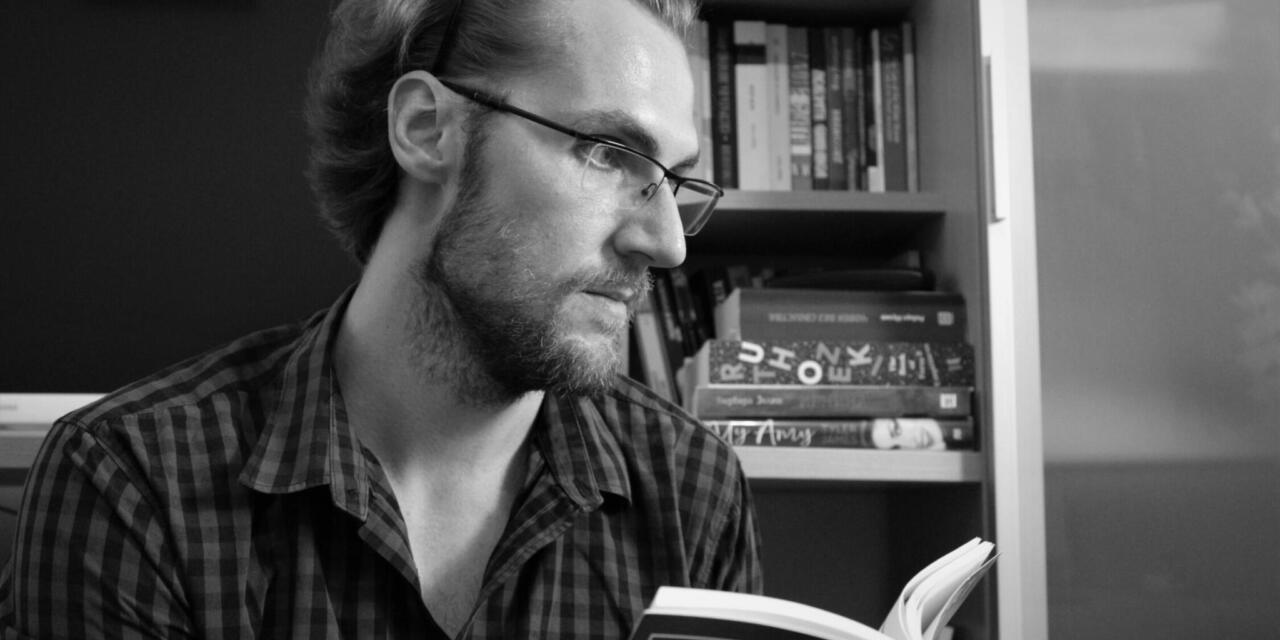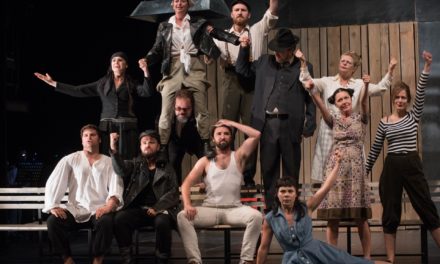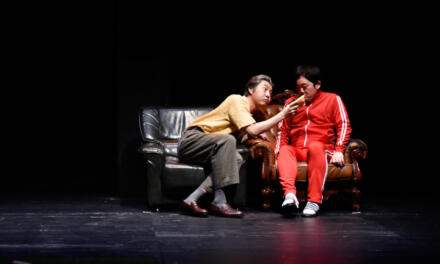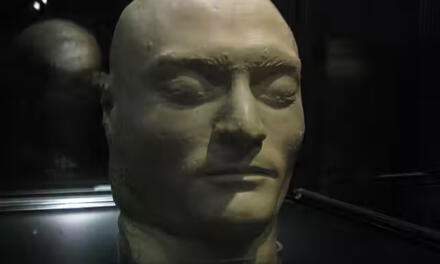Milosh Andonovski (1989) was born in Kumanovo, North Macedonia. He graduated Comparative literature in 2012 at the Faculty of Philology “Blazhe Koneski” at “Sts. Cyril and Methodius” University. In 2014 he obtained his MSc degree in Cultural studies at the Institute for Macedonian literature by conducting a research in which 31 professional actors took part, titled as The influence of cultural and psychological processes on an actor creating a character. In 2015 Andonovski graduated for a second time at the department for Theatre directing, Faculty for Dramatic Arts in Skopje. In 2017 he obtains his teaching qualifications at the Faculty of Education “St. Clement of Ohrid”. Andonovski is also a certified trainer in the field of adult education/life-long learning since 2016. In 2021 he obtains his final MA degree as a Chevening scholar at the University of Kent in England in Theatre Making. His English dissertation is based on a research in which 6 theatre directors took part: Katie Mitchell (UK), Anne Bogart (USA), Tomi Janezhich (SLO), Ulrich Meyer-Horsch (GER), Zoja Buzalkovska (MKD) and Ivan Popovski (MKD/RUS). The dissertation is titled as What do we talk about when we talk about Directing. He is the founder of the Association for theatre education and production ‘Theatre for Everyone’. Andonovski has directed the following theatre plays: “Closer” by Patrick Marber, 2015 at the Macedonian National Theatre; “I, Selma” written and directed by Andonovski, Youth Cultural Centre, Skopje, 2018; “Physics of Sorrow”, a novel by Georgi Gospodinov, Public Theatre of Kumanovo, July 2018; “Hamlet” by William Shakespeare, Navigator Cvetko’s Theatre and Kino Kultura, Skopje, December 2018; “Family Stories” by Biljana Srblanovic, Public Theatre of Prilep, June 2019 – awarded with NETA award for “Overall Artistic Achievement”; Without Authorial Rights, collective authorship, Navigator Cvetko’s Theatre and Kino Kultura, Skopje, December, 2019; “The Future is Private”, written and directed by Andonovski, Upheaval Theatre, Skopje, September, 2020; “Shame”, director-collaborator of Angela Stojanovska’s authorial solo performance, Tiiiit ink!, Skopje, December 2021. He is currently in the preoperational phase of his latest play Skopjani (Citizens of Skopje), which will be produced by “Theatre for Everyone” in November, 2022.
Ivanka Apostolova Baskar: Milosh, what is your position and status in the contemporary theater space in Macedonia? How far have you reached in the development of your career as a theatre director?
Milosh Andonovski: I am just a theater director and an educator. I would not be able to respond further on how far I have reached in the development of my career as in my opinion, it is a lifelong process. It is something that never stops, or at least should not stop. Therefore, I am striving towards changing the old into something new, fresh and become that voice. I am regularly seeking opportunities to learn and grow, while working hard both institutionally and off-institutionally. I believe that a director needs ‘to practice what they preach’, especially if they want to contribute towards the development of theatre art, meaning: they need to keep up with matters, artists, literature etc.
IAB: In your opinion, what is the current state of the independent theater scene in Macedonia, and what are its perspectives?
MA: My biggest concern is whether it really is ‘independent’. The Macedonian ‘independent’ theater scene is far from that since it is often supported governmentally and/or by institutions. An independent scene should be self-sustainable; however, we do not have a well-established patronage or donation culture at all, we lack working/performing spaces, etc. Currently, the ‘independent’ or better said the ‘off-institutional’ theater scene gets a lot less than the institutional one, yet manages to produce better and more original work, which gives me hope, although hope does not pay the bills.
IAB: You are part of the initiative Audicija sega!/Audition NOW! what is the goal of this initiative and what have you been able to achieve so far as an initiative?
MA: Yes, together with 120 unemployed theatre makers (producers, directors, playwrights/dramaturgs and actors) I am part of the Audition NOW! initiative which emerged this year, in March. In a couple of months, after a whole new generation of theater makers will obtain their theater degrees, this number will increase by a minimum of 30 new, unemployed artists. To broaden the context, our country and governmental system still provides employment for life to theater makers, unlike many countries from the world. What this initiative strives for is a higher visibility and accessibility for these unemployed theater makers to institutional work, thus breaking the monopoly, established decades ago as a result of the political polarization in our society.
IAB: You are the founder of the organization Teatar za site/Theater for Everyone, you are active as a mentor in directing and acting; young people love you and want to cooperate with you? What did the work at Theater for Everyone enable you to develop?
MA: In general, it enabled theatre education to be more visible, especially its influence and importance in creating new audiences and new generations of critical thinkers. Personally, it enabled me to explore, learn and develop both my teaching and directing skills.
From last year, Theatre for Everyone shifted its focus from education towards professional production. I believe it is time to stir up some other aspects of theater making in our country. Which ones, or how? I still do not know, but I trust my inner voice, so I have decided to take some rest from teaching and act elsewhere.
IAB: Last year you studied in Canterbury, Great Britain, and you were a Chevening scholarship holder. The great playwright Goran Stefanovski also taught there. What kind of education system and knowledge did you face there, compared to the system in our higher education?
MA: It was rather different than the Macedonian conservatory-like education I have, which is good. In Skopje, I have acquired the basics and foundations of creating a theatre piece, while in the UK I got the opportunity to explore more and make mistakes. All of the lecturers I have learnt from are very thorough, knowledgeable academics and practitioners with their own theater productions/troops. It felt like I got the opportunity to test what I have learnt by the time I had become their students, thus catch a glimpse of who I am as a theatre maker, as well as who I would like to become.
IAB: Your research in the UK is based on a study of the directing methodologies of several theatre directors – Katie Mitchell (UK), Anne Bogart (USA), Zoja Buzalkovska (Macedonia), Ivan Popovski (Russia/Macedonia), Tommy Janezic (Slovenia) and Ulrich Meyer Horsch (Germany). What is similar about them, that is part of your directing methodology and your theatrical nature of creation?
MA: It was a rare, once in a lifetime opportunity to interview all of these ‘masters’ for my research. What most of them share in common is that they define directing by using metaphorical statements. Looking at their answers and after discussing them with my wonderful mentor Roanna Mitchel, a question appeared on how can something defined metaphorically be taught? If directing is playing, or foreseeing, how does one teach students to play or to foresee? What does that mean? Of course, these metaphors are deeply rooted in the personal contexts of the a forementioned directors, and the interviews helped me find the link between what directing is and how it is being described. I would say that is what’s part of my directing: the ability to articulate oneself, in one way or another, while examining the world around us and within us.
IAB: You recently published your professional book – Dramatic Art – a handbook for teachers. What is the purpose of this manual, what should be achieved with the application of this manual, and what problem will have to start to be solved?
MA: In the Macedonian public educational system, high school students are offered the Drama course in their final year of studies. Unfortunately, the teachers who teach it are not qualified to conduct the course properly since they are all Macedonian language and literature teachers. As a result, the Drama course lacks a comprehensive approach and excludes the practice of theater in the classroom. The handbook’s goal is to partner up with the teachers by being the support they need in the process of teaching acting, directing and playwriting – something which the Ministry of education and science has failed to do in the past 20 years, ever since the Drama course was introduced in the curricula. This handbook is the first of its kind in the country, maybe in the region, available both in Macedonian and Albanian language.
IAB: As a theatre director from the younger generation, what is available to you and what is not available in the national theaters in Macedonia?
MA: Accessibility is the biggest struggle. Not having regular access to institutional work affects one’s continuity in their professional development. Personally, for me, I believe things started changing, but it took a while. It took a lot of effort, time, resources; a lot of work for/with zero budget in freezing and dusty spaces. As I mentioned, it is the becoming, not the being in theater that matters.
IAB: As a theatre director, can you make a living from your profession in terms of dynamics and the number of plays you direct per year?
MA: Definitely not. The only ones that make a living out of it are the employed ones, receiving salary, health and pension insurance monthly.
IAB: Regarding theater policies in our country, if someone asks you and hires you for a specific reform in practice, what would you change and improve?
MA: Many things! Firstly, I would change how and to whom the Ministry of Culture allocates funds. Secondly, I would promote patronage and donation opportunities for artists, and lastly: open new spaces for practical work, rehearsals and performances. It is something we lack and urgently need!
Thank you very much, Milosh.
Skopje 2022
This post was written by the author in their personal capacity.The opinions expressed in this article are the author’s own and do not reflect the view of The Theatre Times, their staff or collaborators.
This post was written by Ivanka Apostolova Baskar.
The views expressed here belong to the author and do not necessarily reflect our views and opinions.


















